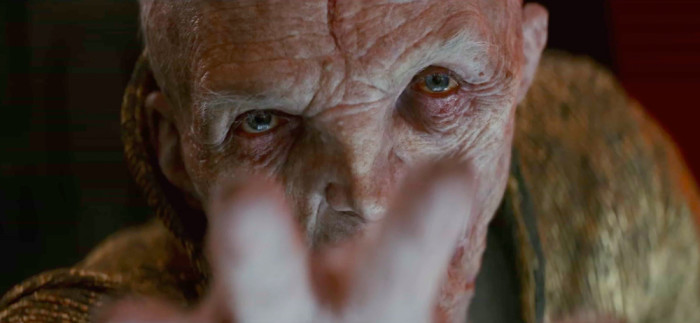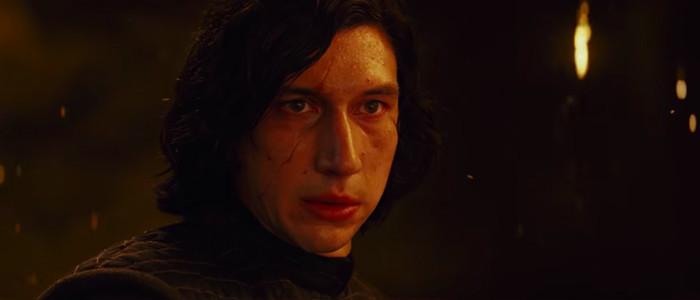'The Last Jedi' Online Backlash Was Amplified By Russian Trolls, According To A New Study
Because we're all stuck in a hellish computer simulation of reality, a new study has revealed that the Star Wars: The Last Jedi online backlash was amplified by Russian trolls, bots, and other politically motivated jerks. That's not to say everyone who disliked Rian Johnson's film is disingenuous, of course – there are plenty of people with their own grievances against the movie, legitimate or otherwise. But per the study, there was a distinctively political bent to the backlash. So much so that "one in three negative fans express misogynist, anti-progressive, anti-social justice or conservative views."
Researcher Morten Bay has released an exhaustive (and exhausting) academic paper in which he delves into the very vocal online backlash that arose following the release of Star Wars: The Last Jedi. There's a lot to parse out here, but this excerpt from the abstract sums things up nicely:
The results of the study show that among those who address The Last Jedi director Rian Johnson directly on Twitter to express their dissatisfaction, more than half are bots, trolls/sock puppets or political activists using the debate to propagate political messages supporting extreme right-wing causes and the discrimination of gender, race or sexuality. A number of these users appear to be Russian trolls. The paper concludes that while it is only a minority of Twitter accounts that tweet negatively about The Last Jedi, organized attempts at politicizing the pop culture discourse on social media for strategic purposes are significant enough that users should be made aware of these measures, so they can act accordingly.
I'm sure there will be an immediate knee-jerk reaction against this. "Russian trolls? Sounds far fetched!" some might say. But Bay's research is persuasive. And it's also worth pointing out that he's not claiming only Russian trolls targeted the film, just a significant number. Here's a look at some of the paper's findings.
Political Motivation
As Bay writes, The Last Jedi was the "first Star Wars film of the Trump presidency," and thus came with a certain emotional baggage. Even though "Star Wars movies, books, video games, tv shows and comics have consistently attempted to convey left-leaning values," there's a certain contingency of fandom that thinks Star Wars is, and always should be, politically neutral.
The Last Jedi "took a no-holds-barred approach to address issues of gender discrimination, class warfare, the destructive character of masculine aggression and war profiteering, while still working within the left-of-center frame constructed by George Lucas in 1977," which apparently infuriated some conservative-minded viewers.
As Bay sees it, right-leaning viewers of The Last Jedi "saw its arguments for equality of gender, race and class as a new, leftist takeover of Star Wars, even though Star Wars has always been politically left-leaning. The Last Jedi is unique in that it landed in the Trump era, acting as a lightning rod at a time when most cinemagoers had chosen a political side for or against the president and adopted the "obsessions and resentments" of their political camp, with social media acting as the primary battleground."
Perhaps anticipating the inevitable negative comments over these findings, Bay also points out that it is "important to stress, of course, that there are also a substantial number of fans who simply think The Last Jedi is a bad film and who use social media to express their disappointment." However, the writer also adds that "Regardless of motive, almost all negative fans express the belief that they are in the majority and that most Star Wars fans dislike The Last Jedi," which simply isn't true when you compile the data. As Bay succinctly says in the conclusion:
First and foremost, the data does not support claims that a majority of fans are so dissatisfied with The Last Jedi that they wish to boycott further Star Wars releases under Disney ownership. Whether you consider the 21.9% (including, political activists, bots and trolls/sock puppets), or the 10.5% (excluding them) tweets expressing a negative attitude towards The Last Jedi, it is clear that a majority is satisfied, more than satisfied or non-committal in their attitudes. It is also shown that a majority of the negative fans with clear gender identifications identify as male, with only a miniscule fraction of negative fans identifying as female. Approximately one in three negative fans express misogynist, anti-progressive, anti-social justice or conservative views. When some detractors of The Last Jedi correctly claim that it is an injustice to place these labels on all negative fans, these detractors also have to contend with the fact that the labels actually fit a large portion of their faction.
Russian Trolls
This is the finding that I'm sure will cause the most eye-rolling, simply because it sounds far-fetched. Why would Russia target The Last Jedi, of all things? Bay doesn't offer a specific motivation at first, and even goes as far as to say this isn't a 100% definitive conclusion. Instead, he writes:
In the present study, the Twitter accounts were categorized after how many of these criteria they met, and those that met a large majority of them would only be placed in the Troll/Bot/Sock Puppet or Russian Troll categories after an extra, qualitative inspection. It is important to mention here that it is widely considered almost impossible to attribute any sort of cyberattack or strategic operation in the online sphere to an actor with absolute certainty, due to the many opportunities for anonymization, masking of IP addresses, adoption of false identities online, etc. (Lobel, 2012; Dipert, 2010; Geers, 2010). This also applies to the trolls and bots found in this study. Though the above described classification has been performed with rigor and the accounts in Troll/Bot/Sock Puppet category fulfill most of the criteria listed, these accounts should be viewed as having a high likelihood of being trolls/sock puppets, bots and Russian trolls. No absolute attributions are claimed.
Bay also says he "identified 33 of the 206 negative accounts" he studied as "trolls and/or sock puppets", set up to trash the film. Of this group, "16 of these 33 troll/sock puppet accounts appear to be Russian trolls," or at least "possess several of the Russian troll characteristics." But why? As Bay puts it, "breakdown of American's sense of community was and continues to be the purpose of the Russian social media influence campaign targeting the West." In other words, these trolls don't actually care about Star Wars specifically. Instead, they just want to fan the flames of discourse, and a kind of cognitive dissonance. And Star Wars isn't the only fandom being targeted:
Star Wars fandom is not the only cultural or pop culture sphere in which these influence operations are conducted...Russian trolls were not just spreading messages of a political nature but were using engagements in pop culture and related fandoms as either an alibi to distract from their other trolling activities, or to insert themselves in online social groups that they may not reach through pure political messaging. By doing the latter, the trolls were able to advance their disinformation practices and create division within the fandoms they infiltrated.
So What?
I'm going to stress this yet again, because I don't want a bunch of people @-ing me: if you, dear reader, don't like The Last Jedi for your own specific film-related reasons – i.e., you think it has plot holes, or you think it leaned too heavily on humor, you thought Luke drinking that weird blue milk was too much, etc., etc. – that's fine! You're more than entitled to that opinion. The purpose of Bay's paper is not to accuse every single person who disliked The Last Jedi of being a Russian troll or a right-leaning individual furious at the portrayal of progressive ideals. Even director Rian Johnson himself commented on this.
And just to be totally clear: this is not about fans liking or not liking the movie – I've had tons of great talks with great fans online and off who liked and disliked stuff, that's what fandom is all about. This is specifically about a virulent strain of online harassment.
— Rian Johnson (@rianjohnson) October 2, 2018
At the same time, the data presented by Bay is alarming, and a bit depressing. While there are obviously people with their own specific grievances against Johnson's movie, there's also a considerable group targeting the film for other nefarious reasons. And that should trouble everyone, no matter what their political beliefs. I'll let Bay's final sentence speak for itself: "As the debate on misinformation, political communication and regulation of social media continues, researchers studying these matters may find it beneficial to turn their attention to pop culture and how political messaging is propagated in its fandoms."



